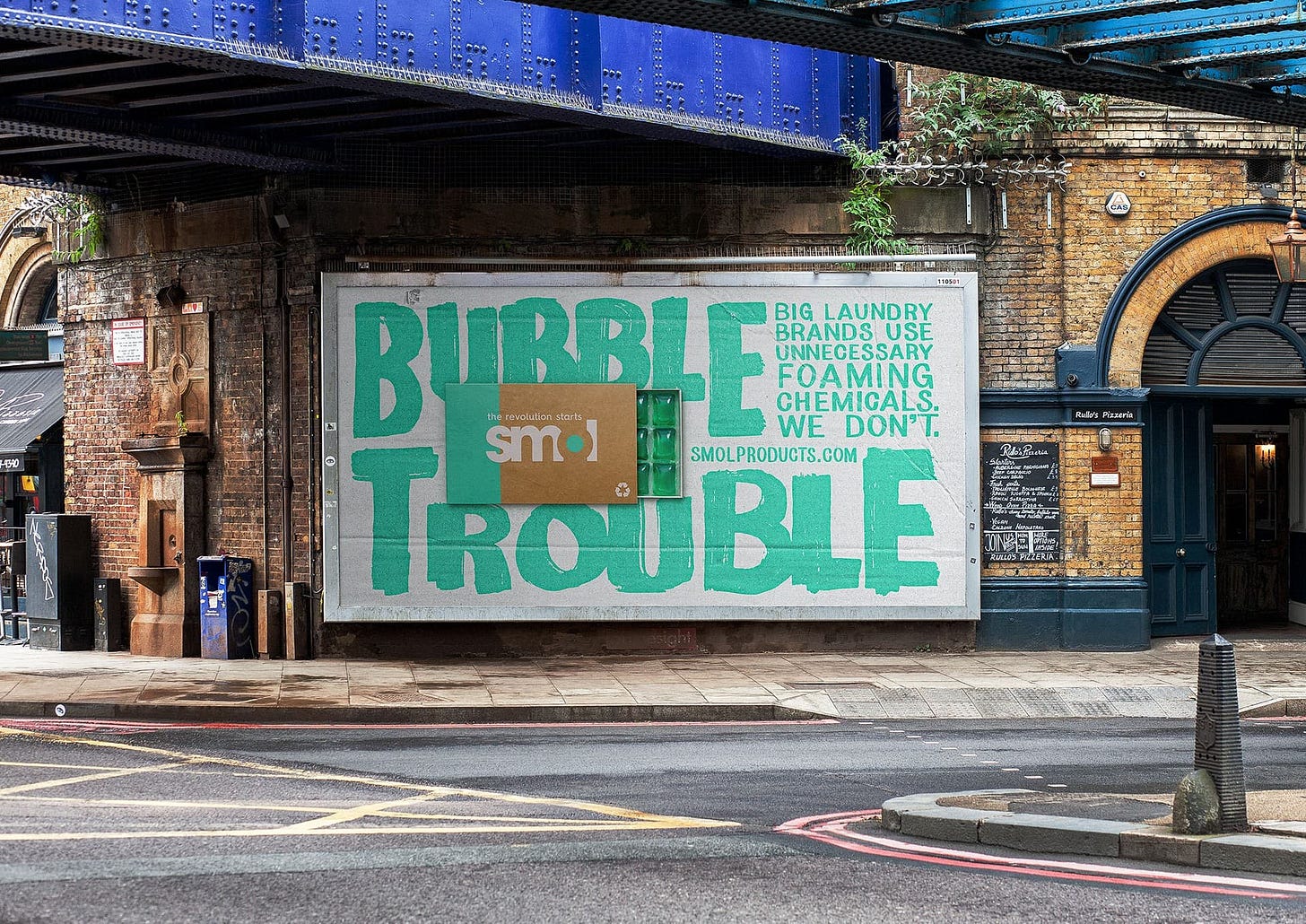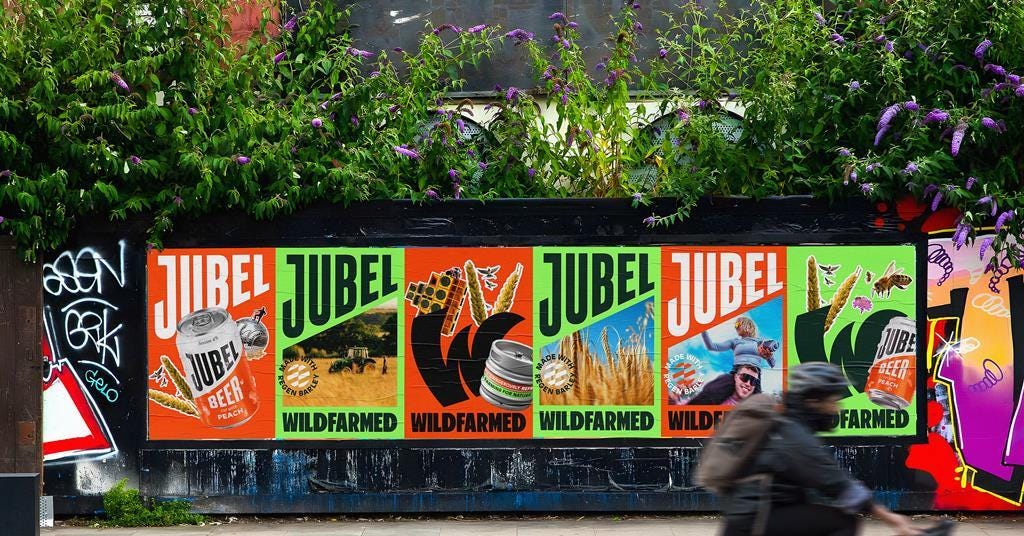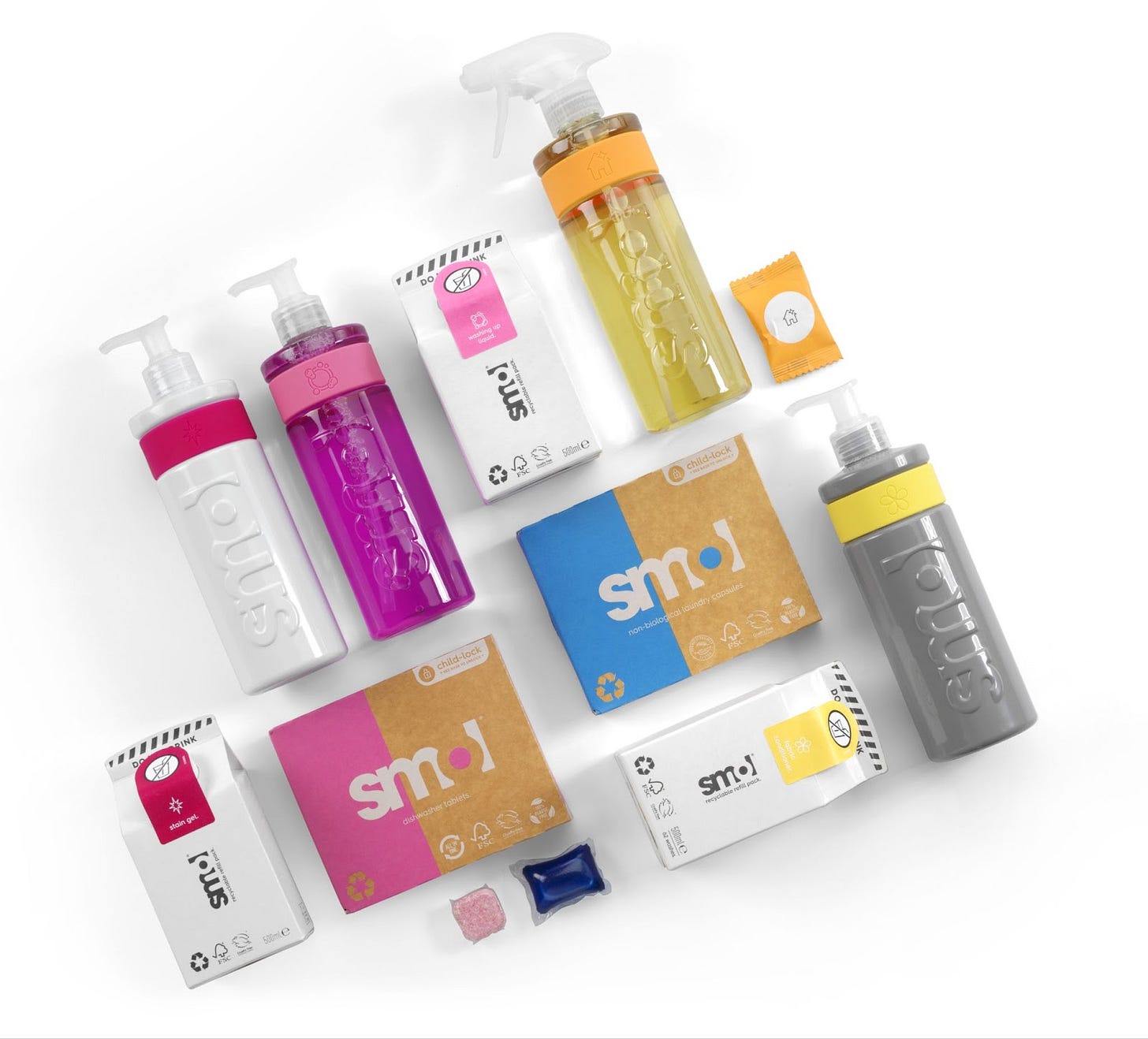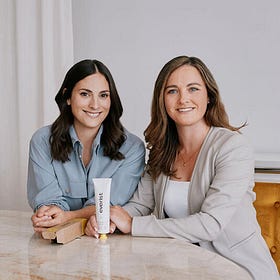🛒 The Check-Out: Maddy Jacobs, smol
+ the latest news and a reminder of EPR regulations
Smol started a revolution to clean up our planet (and your kitchen counters). In the unlikely case you don’t know who they are, they focus on concentrated cleaning products delivered on a subscription model when you need them so you’re not paying for a plastic bottle filled with water (AKA cleaning products pre-smol). They’re a fan favourite of everyone at Following the Footprints so we are very excited to find out more about their sustainability journey from Maddy, Senior People Partner at smol.
As usual - a chunky roundup of this week’s Good(s) News and a reminder of one of our most recent AND most popular articles-that-you-may-have-missed at the end.
Let’s dig in…
6 questions with Maddy Jacobs, Senior People Partner at smol
Hello! We’d love the non-LinkedIn lowdown on who you are, what is smol focused on, and what you were doing before you were making the planet cooler (both meanings intended)?
I’ve had what people might call a ‘squiggly’ career, having worked mainly in communications in lots of different industries, from advertising to brewing. If truth be told, before I joined smol I was pretty burnt out and knew I wanted to try something different. I wanted to help people, work for a company that was mission-driven and feel I was doing something good in the world, so joining the team at smol was a bit of a no brainer. I’m very lucky that they welcomed me in and helped me find a home in their People Team three years ago now!
Since 2018, smol has made sustainable cleaning swaps effortless, accessible and affordable so everyone can join in; that way, we see the greatest change. We set out to challenge the sea of single use plastic we saw in supermarket aisles and are all about creating high-performance, innovative cleaning products that work brilliantly in your home and are better for the planet.
When it comes to our people and the work that I personally do, we work really hard to make sure our team has a voice, that we’re creating a safe, happy and rewarding environment for them, and modelling a way of showing up at work that is human - definitely not perfect, but trying our best.
How does smol think about sustainability? How is smol cleaning up our planet?
It’s really easy to feel completely overwhelmed when you look at what’s going on in the world, and wonder what difference you can really make. At smol, we’ve always taken inspiration from zero-waste chef, Anne Marie Bonneau, who said “we don’t need a handful of people doing zero waste perfectly, we need millions of people doing it imperfectly”. The revolution starts smol, but together we can have a BIG impact.
The belief that business can benefit the planet, its workforce and customers is in our DNA. We became B Corp certified in 2023, and love being a part of this movement because it drives us to be better.
We’re cleaning up the planet by:
Ditching single-use plastic, using refillable bottles-for-life, cardboard packs and refill-cartons.
Reducing carbon emissions by shipping straight to customers’ doors and using lightweight refill tablets where possible or concentrated liquids to avoid the pointless transportation of water.
Scrapping unnecessary chemicals and never, ever testing on animals. All our products are vegan and Leaping Bunny certified.
We’ve also donated 2.5 million laundry capsules to The Hygiene Bank charity and our Suds in Schools initiative provides free-to-use mini laundrettes in over 100 UK schools to help clean up child hygiene poverty .
Sustainable impact is hard to quantify but smol communicates not just the carbon savings associated with using your products, but the plastic, chemicals, animal fat, water savings and washes donated. Do you have any advice to other brands on how to quantify their impact savings?
For us, impact is embedded in our business and sits at the centre of everything we do, rather than just being an afterthought.
It’s important to really know your industry and your product (which hopefully any brand does!) and know what it is that you want to do better or differently. That will tell you what it is you want to measure and help you quantify the savings. We rely heavily on the Life Cycle Assessments that we do for each of our products to get this all important impact data. As part of this, brands should be having transparent dialogue with their suppliers - engaging them in the work that you’re doing and using surveys to get key data points from them.
We’ve also started to work with a third party, Greenly, to calculate our wider carbon footprint as a business. This is in the early stages of being set up to incorporate all of our LCAs, but once it’s going it will help to keep us even more accountable and find areas for improvement.
Internally, we use regular pulse surveys and an annual diversity and inclusion survey to measure our impact for our team and look at how we can make improvements. We try to give the team a voice as much as possible, and use that data, both quantitative and qualitative, to make our decisions, rather than assuming we know what they want. For example, last year we did a benefits survey and introduced schemes according to what mattered most to the team, this included doubling secondary caregiver’s leave to six weeks fully paid, introducing a fertility policy with paid leave for people undergoing treatment, or the partners of people undergoing treatment and partnering with Self Space to provide mental health training to all managers.
Ultimately, as a team at smol we are just doing our best. We’re absolutely not perfect and are always striving to improve our impact for the better of the planet, our people and our community.

Ok, magic wand time; if we could grant you wish for a more sustainable world, what would they be?
I feel boring saying this, but hopefully the Following the Footprints community will be a receptive audience! If I had a magic wand I’d definitely be fixing the recycling systems all across the world: making them simpler and more consistent from place to place… and everyone would innately know how/what/where to recycle, so there’d be no more ‘wish-cycling’ and contaminated bins which end up sent to landfill or incinerated. Recycling rates are falling in the UK and our system clearly isn’t working.
Finally - We’d love some recommendations; one climate-related resource, one person to follow online and one consumer brand that’s killing it!
HURR - I’m very much in the thick of the cycle of weddings and always rent my outfits from HURR. It’s such a brilliant concept and so easy. I highly recommend people try renting their next event outfit! There’s lots of similar companies now and many of them have retail spaces where I live in London, so there’s the opportunity to try on, as I know that’s a blocker for some.
Andrea Cheong - Another fashion-related resource - I love Andrea’s approach to consumerism, educating her audience to look at the quality of individual products by looking at the care labels rather than thinking about ‘good’ or ‘bad’ brands.
The Nature Conservancy - This is a US organisation who do brilliant work, but the reason I’m sharing is because their Instagram account always feels really hopeful - and I think we all need a bit more of that!
> The Good(s) News
🎯 JUBEL & Wildfarmed announced their partnership to pioneer the switch of JUBEL's beer to regenerative barley. This switch helps to deliver carbon savings of over 50% for JUBEL.
🎯 Groupe Clarins announced that they are now B Corp certified, continuing their journey toward sustainable beauty.
🎯 Adolfo Domínguez announced that they are now B Corp certified, the first major Spanish textile fashion company to be certified.
🎯 Circular&Co. announced their partnership with Pret A Manger UAE to launch reusable coffee cup, offering incentives for customers who choose to reuse their coffee cups.
🎯 Urban Farm-It announced their latest innovation, organically certified UK-grown dried Lion's Mane mushrooms. The mushrooms are packaged on-site using 100% recyclable sustainably sourced packaging.
⭐️ Asda announced that their customers have recycled over 3 million coffee pods since the start of 2025 through their partnership with Podback. Plastics and aluminium pods are recycled in the UK, and the coffee grounds are transformed by anaerobic digestion into renewable energy and soil improver.

Follow us on LinkedIn for a fresh digest of Good News every Friday. Have good news? Share it with us - info@followingthefootprints.com!
> Bulletin Board
Events
📆 15th May - Water Literacy - Water Literacy Programme (online)
📆 16th May - The Recharge: Lunchtime Series for Sustainability professionals - Black Leaders in Sustainability Spaces (online)
📆 21st May - The Power of Standardised PCF Exchange - Altruistiq (online)
> Finally, in case you missed it…
🌱 Your Extended Producer Responsibility (EPR) refresh, and why Everist are concentrating on waterless products.
Quick recap, what is EPR?
Under the Organisation for Economic Co-operation and Development’s definition, Extended Producer Responsibility (EPR) is an approach in which a producer’s responsibility for a product is extended to the post-consumer stage of a product’s life cycle. While other policies target a single point in the chain, EPR aims to cover the full value chain, incentivising environmentally beneficial characteristics of both finished goods and production processes.
Want more? Check out our Website! You can find more about the team behind this newsletter, dig through our content archive AND check out our handy databases there too.
Have ideas for what we should write about next? Reply to this email! We’re always looking for inspiration from folks like you.
Until next time!
Team FTF








